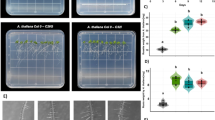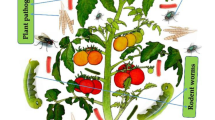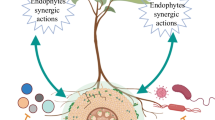Abstract
Insect herbivores possess a diverse and abundant gut microbiota that may influence plant growth in nature. The application of plant beneficial bacteria to improve agricultural production and soil quality has long been of interest. Thus, these insect-associated microbiota have the potential to be developed into effective bio-fertilizers. The bacterium, Enterobacter ludwigii, was isolated from the regurgitant of field-collected tomato fruitworm, Helicoverpa zea. The bacterium can be secreted by the insect onto tomato seeds during fruit feeding and is also commonly found in the soil. We applied E. ludwigii to germinated tomato seeds and measured tomato plant growth and productivity under controlled greenhouse conditions. Since there are often trade-offs between plant growth and plant defenses, we examined whether the E. ludwigii-mediated faster growth corresponds with weaker anti-herbivore defenses. When E. ludwigii was applied to germinated tomato seeds, the plants exhibited faster root, shoot and hypocotyl growth, and produced more fruits and seeds than untreated control plants. The plants treated with bacteria exhibited the same activity levels of two key enzymes involved in anti-herbivore defenses, polyphenol oxidase and peroxidase, and induced the same levels of mortality and growth inhibition in H. zea larvae as untreated plants. Thus, our results demonstrate that the application of E. ludwigii to seeds can promote tomato plant growth and yield without compromising anti-herbivore defenses.






Similar content being viewed by others
References
Aziz M, Nadipalli RK, Xie X, Sun Y, Surowiec K, Zhang JL, Paré PW (2016) Augmenting sulfur metabolism and herbivore defense in Arabidopsis by bacterial volatile signaling. Front Plant Sci 7:458. https://doi.org/10.3389/fpls.2016.00458
Bashan Y (1998) Inoculants of plant growth promoting bacteria for use in agriculture. Biotechnol Adv 16(4):729–770. https://doi.org/10.1016/s0734-9750(98)00003-2
Bashan Y, de-Bashan LE (2005) Bacteria/plant growth-promotion. In: Hillel D (ed) Encyclopedia of soils in the environment. Elsevier, Oxford, pp 103–115
Berger B, Brock AK, Ruppel S (2013) Nitrogen supply influences plant growth and transcriptional responses induced by Enterobacter radicincitans in Solanum lycopersicum. Plant Soil 370(1–2):641–652. https://doi.org/10.1007/s11104-013-1633-0
Berger B, Baldermann S, Ruppel S (2017) The plant growth-promoting bacterium Kosakonia radicincitans improves fruit yield and quality of Solanum lycopersicum. J Sci Food Agric 97(14):4865–4871. https://doi.org/10.1002/jsfa.8357
Bhardwaj D, Ansari MW, Sahoo RK, Tuteja N (2014) Biofertilizers function as key player in sustainable agriculture by improving soil fertility, plant tolerance and crop productivity. Microb Cell Fact 13:66–76. https://doi.org/10.1186/1475-2859-13-66
Burkett GR, Schneider JC, Davis FM (1983) Behavior of the tomato fruitworm, Heliothis zea (Boddie) (Lepidoptera: Noctuidae), on tomato. Environ Entomol 12:905–910. https://doi.org/10.1093/ee/12.3.905
Constabel CP, Bergey DR, Ryan CA (1995) Systemin activates synthesis of wound-inducible tomato leaf polyphenol oxidase via the octadecanoid defense signaling pathway. Proc Natl Acad Sci USA 92:407–411. https://doi.org/10.1073/pnas.92.2.407
de Souza R, Beneduzi A, Ambrosini A, Costa PB, Meyer J, Vargas LK, Schoenfeld R, Passaglia LMP (2013) The effect of plant growth-promoting rhizobacteria on the growth of rice (Oryza sativa L.) cropped in southern Brazilian fields. Plant Soil 366(1–2):585–603. https://doi.org/10.1007/s11104-012-1430-1
de Bobadilla MF, Friman J, Pangesti N, Dicke M, van Loon JJA, Pineda A (2017) Does drought stress modify the effects of plant-growth promoting rhizobacteria on an aboveground chewing herbivore? Insect Sci 24(6):1034–1044. https://doi.org/10.1111/1744-7917.12477
Felton GW, Donato K, Del Vecchio RJ, Duffey SS (1989) Activation of plant foliar oxidases by insect feeding reduces nutritive quality of foliage for noctuid herbivores. J Chem Ecol 15(12):2667–2694. https://doi.org/10.1007/BF01014725
Felton GW, Donato KK, Broadway RM, Duffey SS (1992) Impact of oxidized plant phenolics on the nutritional quality of dietary protein to a noctuid herbivore, Spodoptera exigua. J Insect Physiol 38:277–285. https://doi.org/10.1016/0022-1910(92)90128-Z
Glick BR (2012) Plant growth promoting bacteria: mechanisms and applications. Scientifica 2012:15. https://doi.org/10.6064/2012/963401
Hayat R, Ali S, Amara U, Khalid R, Ahmed I (2010) Soil beneficial bacteria and their role in plant growth promotion: a review. Ann Microbiol 60(4):579–598. https://doi.org/10.1007/s13213-010-0117-1
Indiragandhi P, Anandham R, Madhaiyan M, Sa TM (2008) Characterization of plant growth—promoting traits of bacteria isolated from larval guts of diamondback moth Plutella xylostella (Lepidoptera: Plutellidae). Curr Microbiol 56:327. https://doi.org/10.1007/s00284-007-9086-4
Javaid A (2010) Beneficial microorganisms for sustainable agriculture. In: Lichtfouse E (ed) Genetic engineering, biofertilisation, soil quality and organic farming. Sustainable agriculture reviews, vol 4. Springer, Netherlands, pp 347–369. https://doi.org/10.1007/978-90-481-8741-6_12
Madhaiyan M, Poonguzhali S, Lee JS, Saravanan VS, Lee KC, Santhanakrishnan P (2010) Enterobacter arachidis sp. nov., a plant-growth-promoting diazotrophic bacterium isolated from rhizosphere soil of groundnut. Int J Syst Evol Microbiol 60:1559–1564. https://doi.org/10.1099/ijs.0.013664-0
Mayak S, Tirosh T, Glick BR (2004) Plant growth-promoting bacteria confer resistance in tomato plants to salt stress. Plant Physiol Biochem 42(6):565–572. https://doi.org/10.1016/j.plaphy.2004.05.009
Megali L, Glauser G, Rasmann S (2014) Fertilization with beneficial microorganisms decreases tomato defenses against insect pests. Agron Sustain Dev 34(3):649–656. https://doi.org/10.1007/s13593-013-0187-0
Megali L, Schlau B, Rasmann S (2015) Soil microbial inoculation increases corn yield and insect attack. Agron Sustain Dev 35:1511. https://doi.org/10.1007/s13593-015-0323-0
Mouhamad RS, Fadhel AS, Yousir SA, Razaq IB, Iqbal M, Ayub S, Younas U (2017) Impact of effective microorganisms actuate (EMa) on development of Barley, Corn and Chard plants. Curr Sci Perspect 3(1):60–66. http://bosaljournals.com/csp/images/pdffiles/33CSP.pdf
Myers JH, Sarfraz RM (2017) Impacts of insect herbivores on plant populations. Annu Rev Entomol 62:207–230. https://doi.org/10.1146/annurev-ento-010715-023826
Pangesti N, Reichelt M, van de Mortel JE, Kapsomenou E, Gershenzon J, van Loon JJA, Dicke M, Pineda A (2016) Jasmonic acid and ethylene signaling pathways regulate glucosinolate levels in plants during rhizobacteria-induced systemic resistance against a leaf-chewing herbivore. J Econ Entomol 42:1212–1225. https://doi.org/10.1007/s10886-016-0787-7
Patten CL, Glick BR (1996) Bacterial biosynthesis of indole-3-acetic acid. Can J Microbiol 42:207–220. https://doi.org/10.1139/m96-032
Paul-Victor C, Züst T, Rees M, Kliebenstein DJ, Turnbull LA (2010) A new method for measuring relative growth rate can uncover the costs of defensive compounds in Arabidopsis thaliana. New Phytol 187(4):1102–1111. https://doi.org/10.1111/j.1469-8137.2010.03325.x
Pérez-Torres CA, López-Bucio J, Cruz-Ramírez A, Ibarra-Laclette E, Dharmasiri S, Estelle M, Herrera-Estrella L (2008) Phosphate availability alters lateral root development in Arabidopsis by modulating auxin sensitivity via a mechanism involving the TIR1 auxin receptor. Plant Cell 20(12):3258–3272. https://doi.org/10.1105/tpc.108.058719
Shikano I, Rosa C, Tan C-W, Felton GW (2017) Tritrophic interactions: microbe-mediated plant effects on insect herbivores. Annu Rev Phytopathol 55:313–331. https://doi.org/10.1146/annurev-phyto-080516-035319
Shoebitz M, Ribaudo CM, Pardo MA, Cantorec ML, Ciampia L, Curá JA (2009) Plant growth promoting properties of a strain of Enterobacter ludwigii isolated from Lolium perenne rhizosphere. Soil Biol Biochem 41(9):1768–1774. https://doi.org/10.1016/j.soilbio.2007.12.031
Son JS, Sumayo M, Hwang YJ, Kim BS, Ghim SY (2014) Screening of plant growth-promoting rhizobacteria as elicitor of systemic resistance against gray leaf spot disease in pepper. Appl Soil Ecol 73:1–8. https://doi.org/10.1016/j.apsoil.2013.07.016
Vessey JK (2003) Plant growth promoting rhizobacteria as biofertilizers. Plant Soil 255:571–586. https://doi.org/10.1023/A:1026037216893
Wang J, Peiffer M, Hoover K, Rosa C, Zeng R, Felton GW (2017) Helicoverpa zea gut-associated bacteria indirectly induce defenses in tomato by triggering a salivary elicitor(s). New Phytol 214(3):1294–1306. https://doi.org/10.1111/nph.14429
Zhang Y, Luan H, Wei Z, Hao Z, Xi R, Liao X (2015) Exploiting of honey-associated Bacillus strains as plant-growth promoting bacteria for enhancing barley growth in rare earth tailings. Ann Microbiol 66(2):559–568. https://doi.org/10.1007/s13213-015-1135-9
Züst T, Agrawal AA (2017) Trade-offs between plant growth and defense against insect herbivory: an emerging mechanistic synthesis. Annu Rev Plant Biol 68:513–534. https://doi.org/10.1146/annurev-arplant-042916-040856
Acknowledgements
This work was supported by the United States Department of Agriculture (Agriculture and Food Research Initiative Grant 2017-67013-26596). The China Scholarship Council (Grant 201506300111) provided financial support to Qinjian Pan. A Natural Sciences and Engineering Research Council of Canada Postdoctoral Fellowship (NSERC PDF-488105-2016) provided financial support to Ikkei Shikano. The authors greatly appreciate Dr. Jie Wang for providing the bacterial strain used in this study. We appreciate the suggestions and discussions of Lin Chen in the preparation of this manuscript. We thank Michelle Peiffer for her technical assistance and suggestions. We would also like to thank Dr. Dawn Luthe (Department of Plant Science, Pennsylvania State University) for sharing her laboratory equipment.
Author information
Authors and Affiliations
Corresponding authors
Additional information
Handling Editor: Ritu Chaudhary.
Rights and permissions
About this article
Cite this article
Pan, Q., Shikano, I., Hoover, K. et al. Enterobacter ludwigii, isolated from the gut microbiota of Helicoverpa zea, promotes tomato plant growth and yield without compromising anti-herbivore defenses. Arthropod-Plant Interactions 13, 271–278 (2019). https://doi.org/10.1007/s11829-018-9634-9
Received:
Accepted:
Published:
Issue Date:
DOI: https://doi.org/10.1007/s11829-018-9634-9




